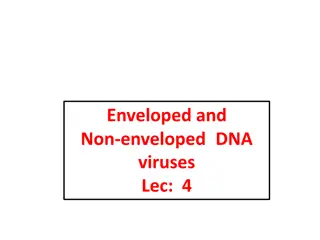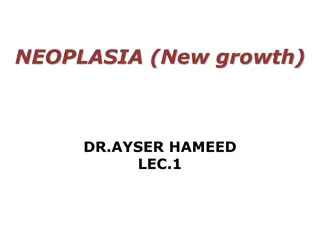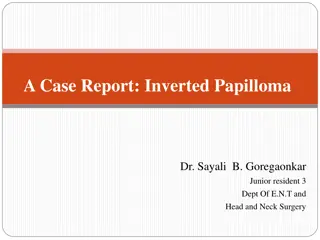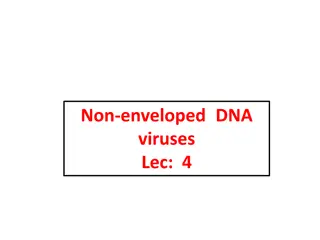Understanding Enveloped and Non-enveloped DNA Viruses
Non-enveloped DNA viruses, surrounded by a protein capsid, are resistant to sterilization and thrive in acidic environments. Adenoviruses, a common non-enveloped type, spread through close contact and contaminated objects. Additionally, Papilloma and Polyoma viruses, causing persistent infections an
0 views • 23 slides
Understanding Laryngeal Tumours: Types, Classification, and Pathology
Laryngeal tumours can be benign or malignant, with different types such as papilloma, chondroma, paraganglioma, and squamous cell carcinoma. These tumours present with various symptoms and may spread through direct, lymphatic, or hematogenous routes. Risk factors include tobacco smoking, alcohol con
0 views • 24 slides
Understanding Neoplasia: Characteristics and Nomenclature of Tumors
Neoplasia, or new growth, is characterized by uncoordinated growth exceeding that of normal tissues, persistent growth independent of stimuli, loss of responsiveness to growth controls, and local expansion regardless of host environment. Tumors are classified into benign and malignant categories in
0 views • 36 slides
Inverted Papilloma Case Report and Diagnosis
A 62-year-old male presented with a mass in the right nasal cavity causing obstruction and headache. No history of URTI or allergies. Local examination revealed a pinkish mass with possible differential diagnosis of Antrochoanal Polyp, Ethmoidal polyposis, or Inverted Papilloma. Nasal endoscopy show
0 views • 24 slides
Overview of Non-Enveloped DNA Viruses and Their Impact on Human Health
Non-enveloped DNA viruses are surrounded by a protein coat called a capsid, making them difficult to sterilize and highly resilient in various environments. This article explores the characteristics and impact of non-enveloped DNA viruses such as Adenoviruses, Papilloma and Polyoma Viruses, and Huma
0 views • 16 slides




